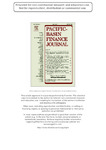Impact of late payment on Firms' profitability: Empirical evidence from Malaysia
| dc.contributor.author | Paul, S | |
| dc.contributor.author | Devi, SS | |
| dc.contributor.author | Teh, CG | |
| dc.date.accessioned | 2018-04-23T15:51:39Z | |
| dc.date.available | 2018-04-23T15:51:39Z | |
| dc.date.issued | 2012-11-01 | |
| dc.identifier.issn | 0927-538X | |
| dc.identifier.uri | http://hdl.handle.net/10026.1/11329 | |
| dc.description.abstract |
This paper examines whether late payment (LP) by customers impacts firms' profitability, using a cross-sectional sample of 287 Malaysian public-listed manufacturing firms for the financial year 2007. This is an important issue given that trade credit is commonly seen as a significant short-term financing practice in Asia. However, in Malaysia, trade credit has not been explored, largely due to the unavailability of relevant published data and the reluctance of firms to divulge information regarding their trade credit practices. To overcome this, we suggest a new measure of LP using the Pareto 80:20 rule to take cognisance of local nuances and industry practice, and argue that Pareto Days Overdue is an appropriate measure of LP for Malaysia. We find that 60% of the sampled firms experience LP and LP has a significant inverse effect on their profitability; and those with shorter credit terms and Days Sales Outstanding (DSO) perform better than those with longer credit terms and longer DSO. The paper also discusses implications for policy makers and regulators since the accounting rules related to the disclosure of receivables in Malaysia are converging towards the International Financial Reporting Standards (IFRS). © 2012 Elsevier B.V. | |
| dc.format.extent | 777-792 | |
| dc.language | en | |
| dc.language.iso | en | |
| dc.publisher | Elsevier BV | |
| dc.subject | 3501 Accounting, Auditing and Accountability | |
| dc.subject | 3502 Banking, Finance and Investment | |
| dc.subject | 35 Commerce, Management, Tourism and Services | |
| dc.subject | 3507 Strategy, Management and Organisational Behaviour | |
| dc.title | Impact of late payment on Firms' profitability: Empirical evidence from Malaysia | |
| dc.type | journal-article | |
| dc.type | Article | |
| plymouth.issue | 5 | |
| plymouth.volume | 20 | |
| plymouth.publication-status | Published | |
| plymouth.journal | Pacific-Basin Finance Journal | |
| dc.identifier.doi | 10.1016/j.pacfin.2012.03.004 | |
| plymouth.organisational-group | /Plymouth | |
| plymouth.organisational-group | /Plymouth/Faculty of Arts, Humanities and Business | |
| plymouth.organisational-group | /Plymouth/Faculty of Arts, Humanities and Business/Plymouth Business School | |
| plymouth.organisational-group | /Plymouth/REF 2021 Researchers by UoA | |
| plymouth.organisational-group | /Plymouth/REF 2021 Researchers by UoA/UoA17 Business and Management Studies | |
| plymouth.organisational-group | /Plymouth/Users by role | |
| plymouth.organisational-group | /Plymouth/Users by role/Academics | |
| dc.rights.embargoperiod | Not known | |
| rioxxterms.versionofrecord | 10.1016/j.pacfin.2012.03.004 | |
| rioxxterms.licenseref.uri | http://www.rioxx.net/licenses/all-rights-reserved | |
| rioxxterms.type | Journal Article/Review |


